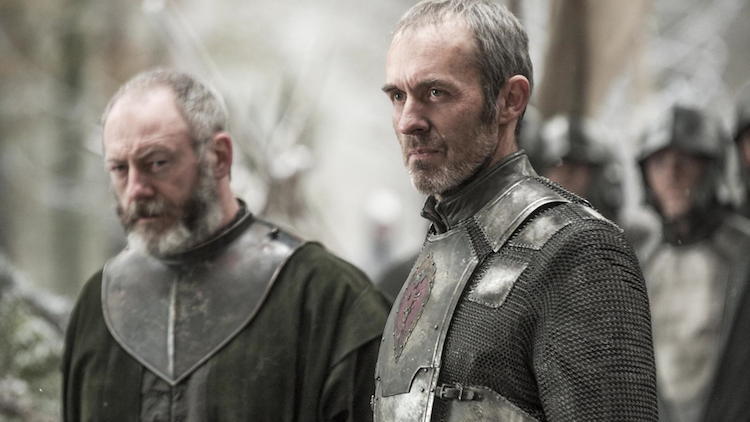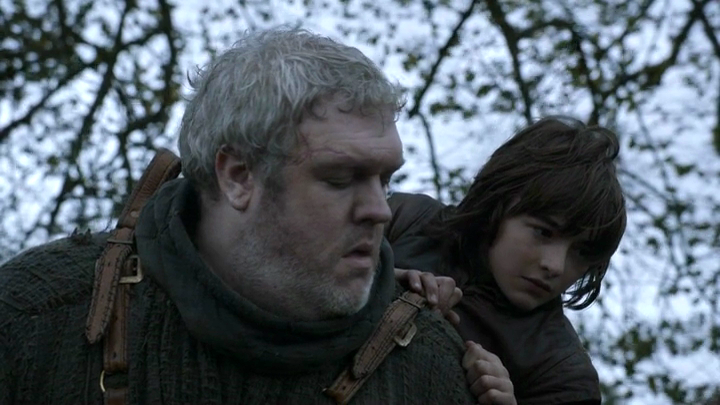Game of Thrones Finally Acknowledges The One True King Stannis Baratheon
Written by Ian Thomas Malone, Posted in Blog, Game of Thrones
One of the downsides, perhaps the primary one, of adapting an epic book series is that certain characters are naturally going to get less screen time than they deserve. Game of Thrones has taken this to a whole new level, mostly out of necessity. While George R.R. Martin is content to have characters disappear for multiple books at a time, this isn’t really realistic for a television program.
The biggest victim of this so far has been Stannis Baratheon, King Robert’s rightful heir. His prominence in season two and the splitting of A Storm of Swords into two seasons makes a statement like this puzzling, especially since Stannis isn’t even a POV character. The problem is that the show has hardly done the one true King justice, while allotting large amounts of screen time to characters who are just as absent from chunks of the source material.
The main problem is that Stannis’ portrayal in season two doesn’t do the character justice, though Stephen Dilane was a strong casting choice. Book Stannis is a strong leader with a firm sense of right and wrong who helps uncover the Lannisters’ deception along with Jon Arryn. In the show, he’s introduced as an easily manipulated power hungry religious loon. The show backs off of this a bit in season three, but the much of the damage is done. At least in the viewers’ mind.
Until the season four finale, it was difficult to talk to fans of the show who hadn’t read the books about the one true king. Using strictly television logic, Stannis’ survival past the Battle of the Blackwater is puzzling. He’s portrayed as the “big bad” to Tyrion and Renly and those types of characters tend to die in season finales. And yet Stannis prevails.
The show’s lax characterization of Stannis deprives the character of his rich personality, which makes him one of the books’ strongest characters. While it’s easy to judge Stannis solely by Ned’s characterization, his maiming of Ser Davos, and his devotion to Melisandre, that just scratches the surface of his personality.
Stannis’ defense of Storm’s End during Robert’s Rebellion is consistently referred to as indicative of the middle Baratheon’s personality as a whole. He had it far worse than any of the other commanding usurpers and was perhaps the only one other than Ned Stark who could’ve held off the Tyrell’s under such dire circumstances. His rigidness proved to be an asset.
Which explains why he’s considered unlikable, but it’s easy to forget how little that actually matters. Stannis might not have been a friend of either Ned Stark or Jon Arryn, but he commanded their respect. The Tyrell’s were the only significant supporter of Renly who didn’t defect to his cause and that was a foregone conclusion anyway.
Stannis commands loyalty even in places where the reader/viewer isn’t supposed to expect it from. Ned refused to back Renly because Stannis was the rightful heir, a move that cost him his life. Davos supports him even after Stannis maimed his hand. He works with Jon Snow even after he was rebuffed on his offer to legitimize him as the heir to Winterfell.
Stannis grows quite a bit as he grapples with his sense of duty to the realm. We see him as more than a man seeking his right to rule, but rather as someone who understands that he is the only person who could actually bring order to Westeros. This point is eloquently featured in the show when Davos and Stannis visit the Iron Bank of Braavos in perhaps the show’s only deviation from the books that served to benefit his character.
While it’s slightly upsetting that the episode dedicated to the Wall didn’t end with Stannis’ arrival, it was great to see him have his moment of triumph after a turbulent two seasons. Since season four didn’t fully catch up with Jon’s plotline, this can sort of be excused. Fans have much to be excited for in the upcoming season as Stannis’ relationship with Jon Snow supplies the meatiest storyline of A Dance With Dragons. By saving The Wall, he shows that he’s the only one who doesn’t crave power solely for the sake of power. He chases justice.
Games of Thrones has an opportunity to let Stannis shine opposite one of the series’ most popular characters, which in turn should raise his image in the eyes of the fans of the shows. Hopefully the show won’t use him as a foil for Snow, who is occasionally at odds with Stannis but manages to gain his respect and eventually helps him rally northmen to his cause. I wouldn’t put it past the show to elevate the Snow legitimization conflict, but that in it of itself would be a further bastardization of Stannis’ character.
Looking to the future of the series, it appears as though Stannis could find himself deeply involved in the eventual Targaryen conflict if the R + L = J theory holds up and if The Onion Knight is successful in retrieving Rickon Stark from the cannibal island. Preview chapters of The Winds of Winter show Stannis’ looming decision regarding the fate of one Theon “Reek” Greyjoy, which will undoubtedly shed more light on Stannis’ overall sense of justice.
Stannis is a perfect example of the depth of characters in A Song of Ice and Fire. While Martin never goes too far out of his way to give the spotlight to the one true king, he’s much more of a three dimensional character than anyone at King’s Landing would have us believe in the first two books. While conventional logic would suggest that Stannis has about a zero percent chance at having a happy ending at the end of the series, Martin has a tendency to keep the reader guessing. Perhaps the Lord of Light will stand with Stannis. I know I will.












